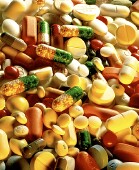
TUESDAY, Jan. 5 (HealthDay News) — There’s been some bad news over the past couple of days for Americans battling depression.
On Monday, a report in the Archives of General Psychiatry found that just one in five depressed adults get guideline-recommended treatment, and on Tuesday a study in the Journal of the American Medical Association found that conventional antidepressants may only really be useful for the severely depressed.
Why — with depression such a widespread problem, and billions invested in the research and development of new treatments — are so many people still suffering?
One team of scientists in Chicago believe they have at least part of the answer. They say that the reason about half of people who need antidepressants don’t respond to available drugs is that researchers have been focusing on the wrong neurological targets.
Developing effective drugs will require a whole new paradigm of thought, contends Eve Redei, a psychiatry professor at the Feinberg School of Medicine of Northwestern University, in Chicago.
“There hasn’t been a novel antidepressant in 20 years,” Redei pointed out. “All [of the current drugs] have the same mechanism of action.”
The largest effectiveness study ever done on depression — Sequenced Treatment Alternatives to Relieve Depression (STAR*D) — examined the benefits of antidepressants in “real-world” settings. It found that, although many people battling depression don’t get better with the first drug they try, remission can be achieved in 50 percent of those who add a drug to their regimen or switch to a new medication.
Redei, who presented results of her new research at the Neuroscience 2009 conference in Chicago this fall, said she hoped to disprove two basic assumptions: that stress causes depression and that reduced levels of the neurotransmitters serotonin, dopamine and norepinephrine also spur depression.
Her team used a “unique” animal model of depression which, Redei said, “mimics as many aspects of human depression as an animal model can.”
They then looked at genes that were expressed in a certain brain region of depressed rats and compared them with genes expressed in the same brain region in stressed rats.
“If stress really causes depression or contributes to depression, I would expect that the genes that are different in a depressed brain will be similar to those that are different in the stressed brain,” Redei said.
Only five genes overlapped.
To address the second question — that a chemical imbalance causes depression — the researchers also focused on genes.
As it turned out, genes that were altered in the depressed rats were not related to the neurotransmitters in question.
“They concluded that depression begins farther up the chain,” said Keith Young, vice chair for research in psychiatry and behavioral science at the Texas A&M Health Science Center College of Medicine. “What they really mean is that there are actual physical differences in the brain related to neurons. Our research has come up with the same conclusions, in that people who are capable of being depressed and severely depressed have different kinds of brains than other people.”
“When you ask why so many people resist antidepressants, I would say there are people who have a different kind of brain and that the drugs just aren’t going to work, that we are going to need to come up with novel ways of looking at this,” he continued. “There are also probably many different kinds of depression.”
But the Chicago findings, however provocative, should not be a siren call for anyone to give up on current antidepressants, Young added.
“In a lot of ways, this paper is very accurate,” he said. “That being said, the first thing you want to do if you have severe depression is go see a professional and, most likely, you will get put on an antidepressant. They help many people.”
Both Young and Dr. Vineeth John, an assistant professor of psychiatry at the University of Miami Miller School of Medicine, felt it would be unwise to downplay the role of stress in depression, even if it’s not cause-and-effect.
And while researchers work to create new drugs to treat especially stubborn cases of depression, psychosocial support can help those not aided by current pharmacology, John said.
More information
The National Institute of Mental Health has more on depression.

